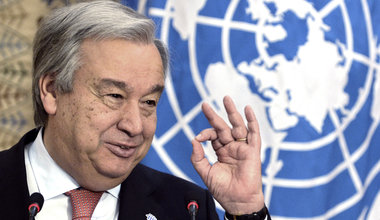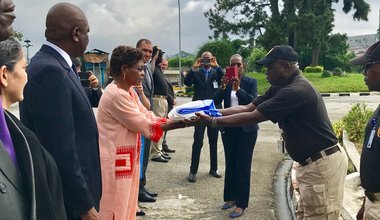Revue de presse internationale du 21décembre 2009
Côte
d`Ivoire: l`ONU inquiète de possibles abus sexuels par des Casques bleus, AFP,
20 décembre 2009-
L'Opération des Nations unies en Côte d'Ivoire (Onuci) s'est déclarée samedi
"extrêmement préoccupée" par des allégations d'exploitation et d'abus sexuels
commis sur des mineures par des Casques bleus déployés dans le pays. "En octobre
2009, l'Onuci a reçu des allégations d'exploitation et d'abus sexuels impliquant
le personnel militaire déployé au sein de la mission. Ces allégations font état
de cas qui remonteraient à 2006 et concerneraient des mineures", indique la
force onusienne dans un communiqué. Une mission d'évaluation a été envoyée en
novembre sur le terrain où les faits se seraient produits, selon la même source
(...)Les autorités du pays dont sont ressortissants les Casques bleus concernés
"ont été saisies par le siège des Nations unies pour leur demander de conduire
une enquête", ajoute l'Onuci, qui n'a pas voulu préciser la nationalité des
présumés auteurs d'abus et le lieu de tels agissements. "Les Nations unies sont
engagées dans une politique de tolérance zéro en matière d'exploitation et
d'abus sexuels", conclut l'Onuci, qui avait été éclaboussée en 2007 par des cas
d'abus sexuels perpétrés par des Casques bleus marocains basés à Bouaké (centre)
(....)
COTE D'IVOIRE:
Malnutrition "critical" in north and west, Irinnews, 19 December 2009-
Fewer children suffer acute malnutrition in northern and western
Côte d'Ivoire than in recent years, but chronic malnutrition has risen to
"critical levels", says a report by the government and UN. In the north acute
malnutrition – 7.2 percent among children under five – is down from
18 percent in 2008, but chronic malnutrition has risen from 30.6 percent in
2008 to 44.7 percent, according to preliminary results of a 2009 nutrition study
by the Ministry of Health, with the UN Children's Fund, World Food Programme and
the Office for the Coordination of Humanitarian Affairs (OCHA). The study showed
chronic malnutrition is at 40 percent in the west. "If these malnutrition levels
are not dealt with, the next hit will be a drama," Eric Gerard, head of NGO
Merlin told IRIN. "The Ministry of Health is well-intentioned [when it comes to
nutrition] but it is overwhelmed and is struggling to cope."(...) The reasons for
such high chronic malnutrition in the north and west are partly developmental,
said Julie Bélanger, head of OCHA in Côte d'Ivoire, who pointed to a lack of
education, poor diets and feeding practices, and reduced access to land due to
conflict. Just 11 percent of women in five of the eight districts studied
practice exclusive breastfeeding, according to the report. And between 5.3
percent and 19.2 percent of households can access safe water (...). Responding to
chronic malnutrition requires reducing poverty, improving health services and
food security, as well as changing behaviour, said Yeo Seydou, UN Food and
Agriculture Organization (FAO) representative in 18 Montagnes. FAO is addressing
the latter in Man by working with local NGO Idée Afrique, whose nutritionist
Tanaka Noel runs a feeding and nutrition-awareness centre next to a government
health clinic. He teaches mothers with malnourished children to make nutritious
cereal powder for their babies, discusses foods to avoid for children and
encourages mothers to feed their children more protein, vegetables and fruit.
Manioc and rice are the staple foods, with chicken, eggs and fish going to the
adults, Noel told IRIN (....) . The PNN is raising nutrition on the government
agenda and recently issued a nutrition strategy, but it does not have enough
resources to put adequate staff in place in vulnerable areas, said ACF nutrition
coordinator Raffaella Gentilini (...). "Malnutrition is an example of just how
fragile the overall health situation is here," she said.
The Daily
Telegraph: Company in toxic waste row expands operations in Africa, Newsedge, 21
December 2009-
TRAFIGURA,
the oil trader that paid pounds 30m in compensation to Ivory Coast citizens
after its toxic waste ended up in their country, has signed a major deal to step
up its activities in Africa. The expansion will see the Dutch-registered company
operating mainly out of London and open about 200 petrol stations in Angola,
according to sources with knowledge of the company.
Trafigura has denied involvement in dumping cheap, dirty oil "slops'' in the
Ivory Coast in 2006, saying it did not know
that the residue would be abandoned by a company paid to discharge the waste. It
also says slops could have caused "low level flu-like symptoms and anxiety'',
but denies they could have caused more serious illnesses. The waste was taken
from Amsterdam to Abidjan, the biggest city in
Ivory Coast, where a local contractor called
Compagnie Tommy unloaded it and dumped it at as many as 18 landfill sites across
the city at night. Within days there were reports that locals had suffered
injuries from exposure to the dumped waste. It settled out of court without
admitting any liability several months ago with 31,000 Ivory Coast
residents, who came together to launch Britain's
largest ever class action at the High Court. Trafigura has already paid more
than pounds 100m to the Ivory Coast
authorities for a clean-up operation and still faces court action in Amsterdam
over allegations, which it denies, that it illegally exported toxic waste.
Trafigura refused to comment on the deal.
Les
enseignants ivoiriens suspendant leur grève, Panapress, 20 décembre 2009-
Les enseignants de l'Enseignement supérieur ainsi que les chercheurs d Côte
d'Ivoire reprendront lundi le chemin des amphithéâtres et des laboratoires,
suite à la levée du mot d'ordre de grêve lancé depuis le 2 novembre par la
Coordination nationale des enseignants du supérieur et des chercheurs (CNEC),
pour réclamer le paiement intégral des salaires et des indemnités (...)
 ONU
ONU Nations Unies Maintien de la paix
Nations Unies Maintien de la paix



